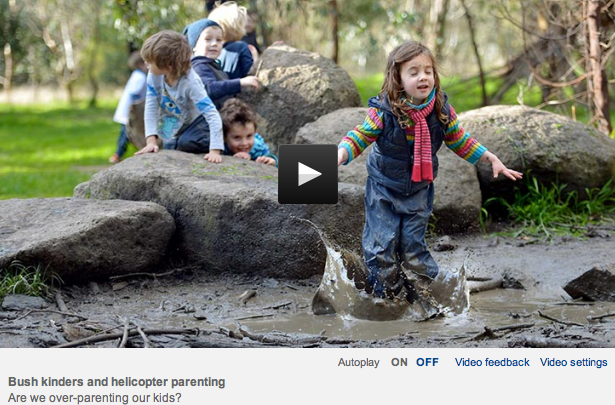Bush Kinder recognises the place the bush has in Australian folklore and the significance of the land in Aboriginal culture. No toys, No tools, No art supplies The children and adults benefit from using only what nature has provided. https://www.bushkinder.education bushkinder@gmail.com
Showing posts with label Doug Fargher. Show all posts
Showing posts with label Doug Fargher. Show all posts
Wednesday, 3 August 2016
Help kids to love the outdoors
“Those natural tools create open-ended imaginative play that we could never do with a man-made or built piece of equipment or art supply. We thought
if we did it properly, then we’d have a model that other services could take on that, potentially, benefits all children.” Doug Fargher
http://www.aww.com.au/mother-and-baby/expert-advice-for-mums/outside-play-24574
Friday, 17 April 2015
Growth of the Bush Kinder movement
The massive growth in the number of bush kinders demonstrates Australians thirst to reconnect children with nature.
The more time children spend in nature the happier, healthier and smarter they are.
Friday, 20 February 2015
Saturday, 16 August 2014
More Nature in Early Childhood Services
Last week I had the pleasure of running professional learning sessions for educators in Banyule and Boroondara. It is great to hear that many participants are already incorporating nature and the outdoors into their programs. They are noticing the benefits and are are looking at ways to extend their practice.
Friday, 15 August 2014
Over-protected, over-organised ... why kids need time to play

Wednesday, 31 July 2013
Saturday, 27 July 2013
Going bush!
Wednesday 31 July 2013
Remember climbing trees and jumping in puddles? Playing in nature was an important part of growing up for most of us. Research suggests that children who spend more time outdoors in nature are happier, healthier, stronger, smarter and more social. Let’s look at ways of reconnecting our children with nature and the outdoors.
Doug Fargher will present this session for parents and guardians of young children.
Doug Fargher is the founder of Bush Kinder, and has been working in Early Childhood for more than 20 years. He is also the proud father of four children. Doug has a passion for allowing children to learn through play, outdoors in nature. Doug is teaching in theBush Kinder program and directing its implementation, as well as consulting and speaking nationally about connecting children with nature.
Places are limited. Registration and payment must be received prior to the session. No refunds or exchanges.
Wednesday, 22 May 2013
Dunkeld Bush Kindergarten
Even farm kids in the bush need Bush Kinder.
Dunkeld is at the foot of the Grampians in rural Victoria. Dunkeld kindergarten now run a very successsful Bush Kinder program. My colleague Ben Goodes and I happily supported the forward thinking educators and parent community at Dunkeld get started with a Bush Kinder to suit their specific needs. Congratulations Dunkeld!
 |
| Click image to watch ABC Video of Dunkeld Bush Kinder |
 |
| Click image for the Dunkeld Bush Kinder story |
Bush Kinder and Regulations
Bush Kinder has challenged many educators view on what early childhood education should look like.
Over the past fortnight I have been fortunate to make conference presentations and engage in discussion with many inspired educators at the City of Yarra and Wyndham City. These Councils see the benefits that engaging children in nature will have on their community.
Too often as educators we do not follow through with great ideas in fear of regulations. Sadly we do this even when we know our ideas are good for children.
As advocates for children we need to question and read more deeply. Australian law and regulations can and does support good curriculum ideas. The Australian National Quality Framework certainly supports educators providing meaningful learning experiences to children. When offering great ideas like Bush Kinder, educators will be challenged to justify why they are offering it. It is important to recognise and articulate why and how Bush Kinder benefits children, their community and the wider world.
Over the past fortnight I have been fortunate to make conference presentations and engage in discussion with many inspired educators at the City of Yarra and Wyndham City. These Councils see the benefits that engaging children in nature will have on their community.
Too often as educators we do not follow through with great ideas in fear of regulations. Sadly we do this even when we know our ideas are good for children.
As advocates for children we need to question and read more deeply. Australian law and regulations can and does support good curriculum ideas. The Australian National Quality Framework certainly supports educators providing meaningful learning experiences to children. When offering great ideas like Bush Kinder, educators will be challenged to justify why they are offering it. It is important to recognise and articulate why and how Bush Kinder benefits children, their community and the wider world.
 |
| With Claire Warden at Wyndham's educators conference. |
Thursday, 14 March 2013
Greening Australia at Melbourne Museum
Together my colleague Annie Jenkins and I had the pleasure of sharing Bush Kinder stories at the Melbourne Museum.
It was fantastic to see interested representatives from the Children's Garden at the Royal Botanic Gardens, the Royal Botanic Gardens at Cranbourne, the Werribee Open Range Zoo, Merri Creek and rangers from parks within the City of Melbourne. These forward thinking people are all looking at ways of providing appropriate wild play spaces for children.
Educators working in early childhood, primary and outside school hours care were also participants in our workshop. They saw clear educational benefit in spending more time teaching their students outdoors in nature.
It was fantastic to see interested representatives from the Children's Garden at the Royal Botanic Gardens, the Royal Botanic Gardens at Cranbourne, the Werribee Open Range Zoo, Merri Creek and rangers from parks within the City of Melbourne. These forward thinking people are all looking at ways of providing appropriate wild play spaces for children.
Educators working in early childhood, primary and outside school hours care were also participants in our workshop. They saw clear educational benefit in spending more time teaching their students outdoors in nature.
Monday, 15 October 2012
Subscribe to:
Comments (Atom)











